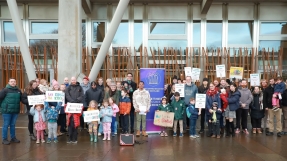More Christians killed in Nigeria
They were reportedly killed in their vehicle as they travelled south to join other family members who have already fled the violence in the predominantly Muslim north of the country.
Yobe State is one of the areas where a state of emergency has been declared by President Goodluck Jonathan following an intensification of attacks on Christians by Boko Haram.
The militant group has threatened to attack several predominantly Christian villages in the north of the country in the last week.
So far attacks have been averted by the deployment of extra security personnel.
On Tuesday, nine people were killed by suspected Boko Haram gunmen in a bar in Potiskum. The victims are believed to have been Christians. The gunmen fled the scene by motorbike.
It follows the shooting of two Christians by gunmen on a motorcycle in the Barracks area of Potiskum on Monday. They survived the attack by pretending they were dead.
The attacks have prompted the imposition of a motorcycle ban and 24-hour curfew in Yobe.
There are fears that Yobe State will be drained of Christians as lorry-loads continue to flee the region.
One source told Christian Solidarity Worldwide (CSW) he was helping more than two hundred indigenous Christians to relocate to another part of Nigeria.
“If this continues unabated, in the next few months or weeks there may be no Christians in Yobe State. Though our houses, jobs and churches are here, we have no choice but to leave.”
CSW fears that widespread protests over government plans to end the fuel subsidy are being harnessed by militants for “alternative agendas”.
One fuel protest in Gusau, in Zamfara State, on Tuesday degenerated into an attack on Ebenezer Baptist church. Rioters removed possessions from the church and set them on fire.
There were also retaliatory attacks earlier this week on the largely Muslim Hausa-Fulani neighbourhoods in Benin City, situated in Nigeria’s predominantly Christian south.
The attacks, which occurred during fuel protests, resulted in the deaths of five people and the destruction of an Islamic school attached to the central mosque.
CSW described the trend as "worrying".













